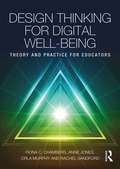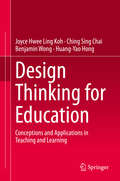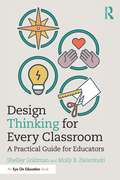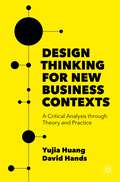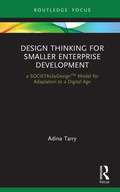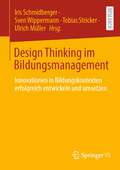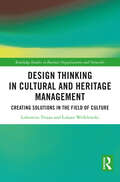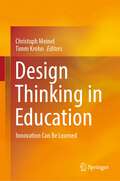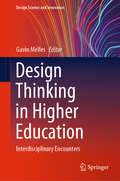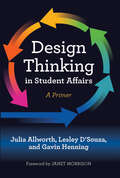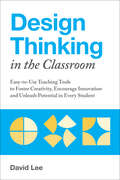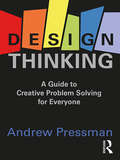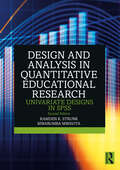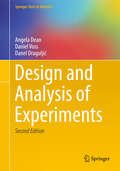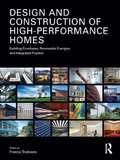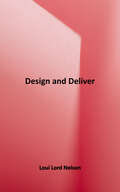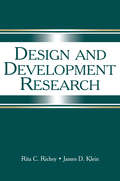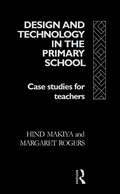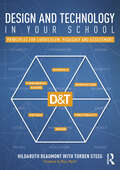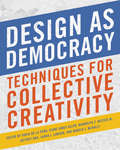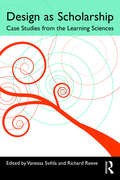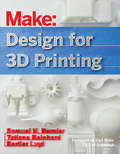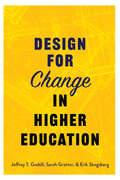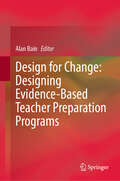- Table View
- List View
Design Thinking for Digital Well-being: Theory and Practice for Educators
by Anne Jones Fiona C. Chambers Orla Murphy Rachel SandfordDesign Thinking for Digital Well-being empowers teacher educators/student teachers to teach pupils how to critically embrace technology in their lives. It provides a pedagogical framework for teaching young people to flourish in a digital society and enjoy digital well-being. In so doing, it establishes the need for digital literacy, digital fluency and values fluency within the education system as a whole. With a unique focus on empathy-centric design thinking, and using a case study informed educational model of technological, pedagogical and content knowledge (TPACK), this expert guide: • Explores the challenges that pupils (and teachers) face balancing their digital lives • Supports the ‘wired generation’ in navigating the cyber sphere and understanding how their data are used • Acknowledges the necessity of supporting the digital well-being of pupils (and teachers) to create a healthy and successful learning environment • Promotes the effective use of technology to enhance teaching and learning • Aids professionals in ensuring pupils enjoy digital literacy, digital fluency, values fluency and safety online Design Thinking for Digital Well-being deals with the core concepts of digital literacy, digital fluency and values fluency that are essential for anyone in the teaching profession. It is a source of support and guidance for all those involved in exploring the challenges of using technology to promote digital well-being.
Design Thinking for Education
by Joyce Hwee Ling Koh Ching Sing Chai Benjamin Wong Huang-Yao HongThis book explores, through eight chapters, how design thinking vocabulary can be interpreted and employed in educational contexts. The theoretical foundations of design thinking and design in education are first examined by means of a literature review. This is then followed by chapters that characterize design thinking among children, pre-service teachers and in-service teachers using research data collected from the authors' design-driven coursework and projects. The book also examines issues associated with methods for fostering and assessing design thinking. In the final chapter, it discusses future directions for the incorporation of design thinking into educational settings. Intended for teachers, teacher educators and university instructors, this book aims to provide them with the theoretical foundations needed to grasp design thinking, and to provide examples of how design thinking can be interpreted and evaluated. The materials covered will help these groups of professionals to consider how design thinking can be integrated into their own teaching and learning contexts. The book will also promote a discourse between educational researchers on the theoretical development of design thinking in educational settings.
Design Thinking for Every Classroom: A Practical Guide for Educators
by Shelley Goldman Molly B. ZielezinskiDesigned to apply across grade levels, Design Thinking for Every Classroom is the definitive teacher’s guide to learning about and working with design thinking. Addressing the common hurdles and pain points, this guide illustrates how to bring collaborative, equitable, and empathetic practices into your teaching. Learn about the innovative processes and mindsets of design thinking, how it differs from what you already do in your classroom, and steps for integrating design thinking into your own curriculum. Featuring vignettes from design thinking classrooms alongside sample lessons, assessments and starter activities, this practical resource is essential reading as you introduce design thinking into your classroom, program, or community.
Design Thinking for New Business Contexts: A Critical Analysis through Theory and Practice
by David Hands Yujia HuangThis textbook identifies and critically explores the new business landscape through the lens of design thinking and contemporary industry practice, bridging the divide between the design and business domains. The book outlines the evolution of design thinking and the relationship between business and design, as well as provides in-depth studies of design thinking in turbulent business contexts, that includes the themes of sustainability, branding and organisational innovation. At its core, it articulates that design thinking is vital to establishing dynamic interdisciplinary thinking models that lead to organizational innovation. Featuring case studies and learning tasks, the book presents design thinking for readers as an organisational philosophy as opposed to a simple problem-solving tool.
Design Thinking for Smaller Enterprise Development: a SOCIETALbyDesign Model for Adaptation to a Digital Age
by Adina TarryDesign Thinking for Smaller Enterprise Development captures the zeitgeist and concerns of the new Millennium and offers a fresh view on how business can be successful by benefiting the wider society it should serve. It also highlights the systemic negative impact of a consumptionand profit-focussed economy and introduces an original model – SOCIETALByDesign™ – as a constructive alternative to relentless resource depletion, through an agile, adaptive, and respectful enterprise, which protects nature and civilisation and embraces a balanced and holistic purpose to serve people, planet and a positive legacy, as the heart of its very reason of being. The original SOCIETALByDesign™ model positions purpose, principles, framework and current techniques for a modern business to utilise and holistically integrate benefits for employees, society and environment thought its products and services. The SOCIETALByDesign™ model links purpose and business and synthesises an operating model that can be adopted, adapted and applied by any enterprise wishing to focus on shared prosperity and the good of people and planet instead of profit at any price. The book is intended for business practitioners such as business founders and owners, angel investors, entrepreneurs, portfolio managers of investment funds, managers and leaders of companies large and small. It is also helpful for external business and organisation development consultants, mentors, coaches and specialists who provide services and expertise to enterprises design, change and optimisation. Because the book provides a practitioner’s perspective on business, it can also be useful to students, lecturers and academics.
Design Thinking im Bildungsmanagement: Innovationen in Bildungskontexten erfolgreich entwickeln und umsetzen
by Ulrich Müller Tobias Stricker Iris Schmidberger Sven WippermannDer vorliegende Sammelband eröffnet sowohl theoretische als auch praxisorientierte Perspektiven auf Design Thinking in Bildungskontexten. Die internationalen Beiträge geben Einblicke in unterschiedliche Nutzungsmöglichkeiten der zielgruppenzentrierten Innovationsmethodologie im Bildungsbereich - von Schule über Hochschule und Weiterbildung bis hin zur betrieblichen Organisationsentwicklung - und unterstützen so die erfolgreiche Initiierung und Umsetzung von Innovationen im Bildungsmanagement.
Design Thinking in Cultural and Heritage Management: Creating Solutions in the Field of Culture (ISSN)
by Lubomira Trojan Łukasz WróblewskiThe ability to discover and respond to societal needs in the field of culture requires an integrated, interdisciplinary, and cross-sectoral approach. Such a holistic view is offered by the design thinking method, which has been extracted from the field of design and could be applied also in the sphere of culture. Interdisciplinarity and consideration of users' needs are characteristics of contemporary design and can be a significant support when faced with the challenges of cultural heritage management. The abovementioned factors act as the premise behind undertaking an analysis of the possibility of adapting the design thinking method to the management of intangible cultural heritage, and to develop a model of the design thinking process for this area. This research volume is the first comprehensive study of the application of the design thinking method to cultural management, especially management of the intangible cultural heritage. It asserts that design thinking can bring numerous benefits to organizations involved in the management of intangible cultural heritage and to its depositories. It will be of interest to researchers and academics in the fields of public and nonprofit management, strategic management, and value creation in the field of culture; students of design for culture and heritage; and practitioners in cultural management.
Design Thinking in Education: Innovation Can Be Learned
by Christoph Meinel Timm KrohnEducation needs new ways to prepare individuals and societies for the multitude of changing challenges in the twenty-first century. In today's world—characterized by digitization, increasing speed, and complexity—design thinking has established itself as a powerful approach to human-centered innovation that can help address complicated problems and guide change in all areas of life. Design thinking formats not only teach skills that benefit people as they expand their "toolbox," but also create affective and cognitive outcomes. This book includes experiences, approaches, and reflections on design thinking in education from different perspectives of renowned design thinking experts from the network of the Hasso Plattner Institute and its School of Design Thinking. Using real-world examples, the book provides insights into requirements and protocols that design thinking practitioners can apply to transform their academic or professional ecosystem. It will be of interest for readers who work in or are interested in a wide variety of educational contexts.
Design Thinking in Higher Education: Interdisciplinary Encounters (Design Science and Innovation)
by Gavin MellesThis book addresses the contributions of design thinking to higher education and explores the benefits and challenges of design thinking discourses and practices in interdisciplinary contexts. With a particular focus on Australia, the USA and UK, the book examines the value and drawbacks of employing design thinking in different disciplines and contexts, and also considers its future.
Design Thinking in Student Affairs: A Primer
by Gavin W. Henning Julia Allworth Lesley D'SouzaDesign thinking is an innovative problem-solving framework. This introduction is the first book to apply its methodology to student affairs and, in doing so, points the way to its potentially wider value to higher education as a whole.With its focus on empathy, which is the need to thoroughly understand users’ experiences, design thinking is user-centered, similar to how student affairs is student-centered. Because the focus of design thinking is to design with users, not for users, it aligns well with student affairs practice. In addition, its focus on empathy makes design thinking a more equitable approach to problem-solving than other methods because all users’ experiences—not just the experiences of majority or “average” student—need to be understood. Centering empathy in problem-solving processes can be a tool to disrupt higher education systems and practices.Design thinking is a framework to foster innovation, and, by its nature, innovation is about responding to change factors with creativity. In an organization, design thinking is inherently connected to organizational change and culture because the process is really about changing people to help them rally around a disruptive idea. Implementing design thinking on a campus may in itself be disruptive and require a change management process. The beauty of using design thinking is that it can also act as a framework to support organizational culture change.Design thinking approaches, with their focus on stakeholder needs (as opposed to systemic norms), collaborative solutions building, and structured empathy activities can offer a concrete tool to disrupt harmful systems of power and oppression. Design thinking as a process is not a magic solution to equity problems, though it can be a powerful tool to approach the development of solutions that can address inequity. Design thinking is data-driven and considers both qualitative and quantitative data as necessary to gain most complete picture of an issue and its possible solutions, whether a product, program, or service.Design thinking has numerous benefits to afford students affairs. Chapter 1 outlines a case for design thinking in student affairs. Chapter 2 discusses a brief history of design thinking, noting its germination and evolution to current practice. Chapter 3 provides a detailed description of each step of the design thinking model with pertinent examples to make the steps clearer. Chapter 4 explains the intersection of equity and design thinking while chapter 5 explores the use of design thinking for organizational change. Chapter 6 presents a new model for design thinking assessment. Chapter 7 addresses the challenges and limitations of the process. Chapter 8 concludes the book by discussing the alignment of design thinking and student affairs and outlining next steps.Design thinking is an innovative process that can change the way higher education and student affairs operates, realizing the potential it offers.
Design Thinking in the Classroom: Easy-to-Use Teaching Tools to Foster Creativity, Encourage Innovation and Unleash Potential in Every Student (Books for Teachers)
by David LeeA teacher’s guide to empowering students with modern thinking skills that will help them throughout life.Design thinking is a wonderful teaching strategy to inspire your students and boost creativity and problem solving. With tips and techniques for teachers K through 12, this book provides all the resources you need to implement Design Thinking concepts and activities in your classroom right away. These new techniques will empower your students with the modern thinking skills needed to succeed as they progress in school and beyond.These easy-to-use exercises are specifically designed to help students learn lifelong skills like creative problem solving, idea generation, prototype construction, and more. From kindergarten to high school, this book is the perfect resource for successfully implementing Design Thinking into your classroom.
Design Thinking: A Guide to Creative Problem Solving for Everyone
by Andrew PressmanDesign thinking is a powerful process that facilitates understanding and framing of problems, enables creative solutions, and may provide fresh perspectives on our physical and social landscapes. Not just for architects or product developers, design thinking can be applied across many disciplines to solve real-world problems and reconcile dilemmas. It is a tool that may trigger inspiration and the imagination, and lead to innovative ideas that are responsive to the needs and issues of stakeholders. Design Thinking: A Guide to Creative Problem Solving for Everyone will assist in addressing a full spectrum of challenges from the most vexing to the everyday. It renders accessible the creative problem-solving abilities that we all possess by providing a dynamic framework and practical tools for thinking imaginatively and critically. Every aspect of design thinking is explained and analyzed together with insights on navigating through the process. Application of design thinking to help solve myriad problems that are not typically associated with design is illuminated through vignettes drawn from such diverse realms as politics and society, business, health and science, law, and writing. A combination of theory and application makes this volume immediately useful and personally relevant.
Design and Analysis in Quantitative Educational Research: Univariate Designs in SPSS
by Kamden K. Strunk Mwarumba MwavitaDesign and Analysis in Quantitative Educational Research: Univariate Designs in SPSS presents an integrated approach to learning about research design alongside statistical analysis concepts. The authors maintain a focus on applied educational research throughout the text, with practical tips and advice on how to do high-quality quantitative research.This book teaches research design (including epistemology, research ethics, forming research questions, quantitative design, sampling methodologies, and design assumptions) and introductory statistical concepts (including descriptive statistics, probability theory, and sampling distributions), basic statistical tests (like z and t), ANOVA designs, including more advanced designs like the factorial ANOVA and mixed ANOVA, simple linear regression, and multiple regression using SPSS for analysis. Designed specifically for an introductory graduate course in research design and statistical analysis, the book takes students through principles by presenting case studies, describing the research design principles at play in each study, and then asking students to walk through the process of analyzing data that reproduce the published results. The new edition has been updated to include the latest contemporary research developments, coverage of IBM SPSS Statistics version 29, and also features new case studies, many focused on race and racism as well as other equity and justice work, and additional content on covariance and correlation. An online eResource is also available with data sets.This textbook is tailor-made for first-level doctoral courses in research design and analysis, and will also be of interest to graduate students in education and educational research.
Design and Analysis of Experiments
by Angela Dean Daniel Voss Danel DraguljićHandbook of Design and Analysis of Experiments provides a detailed overview of the tools required for the optimal design of experiments and their analyses. The handbook gives a unified treatment of a wide range of topics, covering the latest developments. This carefully edited collection of 25 chapters in seven sections synthesizes the state of the art in the theory and applications of designed experiments and their analyses. Written by leading researchers in the field, the chapters offer a balanced blend of methodology and applications. The first section presents a historical look at experimental design and the fundamental theory of parameter estimation in linear models. The second section deals with settings such as response surfaces and block designs in which the response is modeled by a linear model, the third section covers designs with multiple factors (both treatment and blocking factors), and the fourth section presents optimal designs for generalized linear models, other nonlinear models, and spatial models. The fifth section addresses issues involved in designing various computer experiments. The sixth section explores "cross-cutting" issues relevant to all experimental designs, including robustness and algorithms. The final section illustrates the application of experimental design in recently developed areas. This comprehensive handbook equips new researchers with a broad understanding of the field's numerous techniques and applications. The book is also a valuable reference for more experienced research statisticians working in engineering and manufacturing, the basic sciences, and any discipline that depends on controlled experimental investigation.
Design and Construction of High-Performance Homes: Building Envelopes, Renewable Energies and Integrated Practice
by Franca TrubianoBoth professionals and students are increasingly committed to achieving high-performance metrics in the design, construction and operation of residential buildings. This book responds to this demand by offering a comprehensive guide which features: architectural innovations in building skin technologies which make lighter more transparent buildings high performing; energy-free architectural design principles and advances in building-integrated photovoltaics; essential engineering principles, controls and approaches to simulation for achieving net zero; the advantages of integrated design in residential construction and the challenges and opportunities it engenders; detailed case studies of innovative homes which have incorporated low-energy design solutions, new materials, alternative building assemblies, digital fabrication, integrated engineering systems and operational controls. Divided into four parts, the book discusses the requisite AEC (Architecture, Engineering and Construction) knowledge needed when building a high-performance home. It also communicates this information across four case studies, which provide the reader with a thorough overview of all aspects to be considered in the design and construction of sustainable homes. With contributions from experts in the field, the book provides a well-rounded and multi-faceted approach. This book is essential reading for students and professionals in design, architecture, engineering (civil, mechanical and electrical), construction and energy management.
Design and Deliver: Planning and Teaching Using Universal Design for Learning
by Loui Lord NelsonUniversal Design for Learning (UDL) is the best way to teach all students effectively and break down barriers to learning―but how can busy teachers get started with UDL right now? Find the answers in the second edition of this bestselling, teacher-trusted primer, created by internationally recognized UDL expert Loui Lord Nelson. Thoroughly updated to reflect new research and developments in the field of UDL, this book gives K–12 teachers a reader-friendly UDL introduction and a practical framework for implementation, with guidelines and checkpoints for designing effective, barrier-free lesson plans and learning environments. You’ll learn how to use the three core principles of UDL―Engagement, Representation, and Action and expression―to present information in multiple ways and ensure access for all learners. Throughout the book, detailed examples, stories, illustrations, teacher reflections, and activities reinforce UDL principles and help you put them into practice in both virtual and in-person settings. Written in first person, like a face-to-face talk with a passionate educator, this research-based book will guide you in designing equitable, inclusive, and culturally responsive learning environments that meet the needs of diverse learners. An essential UDL introduction for both preservice and inservice educators! WHAT’S NEW: - Key insights from the latest neuroscience research - Useful stories and practical tips from teachers implementing UDL - Technology bytes: timely tips and ideas on how to enhance online learning with UDL - Expert guidance on current topics, including culturally responsive teaching, urban education, and a focus on the expert learner - “Ponder this” prompts throughout the book to help readers consider new ideas and discover additional resources - End-of-chapter “check-ins” that help readers apply what they’ve learned - ONLINE MATERIALS: Designing instruction with UDL is easier than ever with these online resources, available as printable downloads: CAST UDL Guidelines; an Identifying Your Resources chart; a UDL design cycle graphic; a UDL lesson plan flowchart; and classroom resource mapping charts for elementary, middle, and high school teachers.
Design and Development Research: Methods, Strategies, and Issues
by Rita C. Richey James D. KleinAECT Design & Development Outstanding Book Award for 2008! Design and Development Research thoroughly discusses methods and strategies appropriate for conducting design and development research. Rich with examples and explanations, the book describes actual strategies that researchers have used to conduct two major types of design and development research: 1) product and tool research and 2) model research. Common challenges confronted by researchers in the field when planning and conducting a study are explored and procedural explanations are supported by a wide variety of examples taken from current literature. Samples of actual research tools are also presented. Important features in this volume include: concise checklists at the end of each chapter to give a clear summary of the steps involved in the various phases of a project; an examination of the critical types of information and data often gathered in studies, and unique procedures for collecting these data; examples of data collection instruments, as well as the use of technology in data collection; and a discussion of the process of extracting meaning from data and interpreting product and tool and model research findings. Design and Development Research is appropriate for both experienced researchers and those preparing to become researchers. It is intended for scholars interested in planning and conducting design and development research, and is intended to stimulate future thinking about methods, strategies, and issues related to the field.
Design and Development of Training Games
by Talib S. Hussain Susan L. ColemanThe multidisciplinary nature of learning-games development is key to successful projects. In this book, field leaders in serious games and professionals in entertainment games share practical guidelines and lessons from their own experiences researching and developing learning games. This volume includes: • The key elements of design and development that require particular attention from multiple disciplines to ensure success • An overview of successful models and methods, and the trade-offs made throughout the process, to guide development • Cohesive, multidisciplinary views of the issues that arise and of the techniques applied in order to produce effective learning games grounded in specific experiences, community consensus, and analysis of successful learning games that have already been released • The stories behind the games, to illustrate how final design and development decisions were reached. Aimed at professionals and academics interested in developing and researching learning games, it offers a comprehensive picture of the state of the art.
Design and Technology in the Primary School: Case Studies for Teachers (Subjects in the Primary School)
by Margaret Rogers Hind MakiyaThe inclusion of technology among the National Curriculum foundation subjects is an exciting , but at the same time somewhat daunting challenge for primary teachers. This series of case studies shows how real teachers across the primmary age range have put design and technology into practice as a focus for their topic work. Through these examples Margaret Rogers and Hind Makiya show what is meant by design and technology in the primary school and how problem solving activiies can be used to fulfil the requirements of the National Curriculum across several subjects. Useful appendices summarize the technology requirements of the National Curriculum and give extra guidance in common areas of difficulty such as the introduction of electricity and the use of electricity and the use of technical lego.
Design and Technology in your School: Principles for Curriculum, Pedagogy and Assessment
by HildaRuth Beaumont Torben SteegThis book addresses the practicalities of establishing Design & Technology as a worthwhile subject in the secondary school. Written by two leading experts in the field, it explores the way in which Design & Technology may be taught so that it makes a unique contribution to the learning of young people. It provides Design & Technology departments with practical information and guidance around key issues such as planning and assessing the subject, justifications for teaching it as well as ways in which schools can manage and sustain teaching Design & Technology long term.In dealing with the breadth and depth of Design & Technology this book: Provides rationales for Design & Technology which go far beyond the usual limited economic utility argument. Considers the underpinning philosophies of technology and design and the essential place of values, clarifying the substantive and disciplinary knowledge. Discusses five important issues: decolonising the subject, gender, disruption, global warming, pollution and waste. Describes how a Design & Technology curriculum may be planned, taking into account content, resources and learning activities to achieve breadth, balance, and progression. Defines how the subject may be taught through a range of complimentary methods. Considers a wide range of assessment practices that meet the varied learning embedded within the subject. Discusses how support for the subject can be achieved by collaboration with a wide range of interested parties. This book is a valuable resource for heads of departments, trainee and practicing teachers, those engaged in further professional development and all who want to make the learning of Design & Technology an interesting, motivating, and exciting experience for young people.
Design as Democracy: Techniques for Collective Creativity
by Jeffrey Hou David de la Pena Diane Jones Allen Randolph T. Hester Jr. Laura J. Lawson Marcia J. McNallyHow can we design places that fulfill urgneeds of the community, achieve environmental justice, and inspire long-term stewardship? By bringing community members to the table, we open up the possibility of exchanging ideas meaningfully and transforming places powerfully. Collaboration like this is hands-on democracy in action. It's up close. It's personal. For decades, participatory design practices have helped enliven neighborhoods and promote cultural understanding. Yet, many designers still rely on the same techniques that were developed in the 1950s and 60s. These approaches offer predictability, but hold waning promise for addressing currand future design challenges. Design as Democracy: Techniques for Collective Creativity is written to reinvigorate democratic design, providing inspiration, techniques, and case stories for a wide range of contexts.Edited by six leading practitioners and academics in the field of participatory design, with nearly 50 contributors from around the world, Design as Democracy shows how to design with communities in empowering and effective ways. The flow of the book's nine chapters reflects the general progression of community design process, while also encouraging readers to search for ways that best serve their distinct needs and the culture and geography of diverse places. Each chapter presents a series of techniques around a theme, from approaching the initial stages of a project, to getting to know a community, to provoking political change through strategic thinking. Readers may approach the book as they would a cookbook, with recipes open to improvisation, adaptation, and being created anew.Design as Democracy offers fresh insights for creating meaningful dialogue between designers and communities and for transforming places with justice and democracy in mind.
Design as Scholarship: Case Studies from the Learning Sciences
by Vanessa Svihla Richard ReeveFor researchers in the Learning Sciences, there is a lack of literature on current design practices and its many obstacles. Design as Scholarship in the Learning Sciences is an informative resource that addresses this need by providing, through a robust collection of case studies, instructive reference points and important principles for more successful projects. Drawing from the reflections of diverse practitioners, this text includes response sections that guide readers in understanding the research in the context of their own work. It touches upon educational technologies, community co-design, and more, and is grounded in the critical analysis of experts seeking to grow the community.
Design for 3D Printing: Scanning, Creating, Editing, Remixing, and Making in Three Dimensions
by Bertier Luyt Samuel N. Bernier Tatiana ReinhardFrance's Le FabShop has extensive experience testing 3D printers and creating digital models for them. From an articulated Makey Robot to a posable elephant model, Samuel N. Bernier and the rest of Le FabShop's team have created some of the most-printed designs in the 3D printing world. This book uses their work to teach you how to get professional results out of a desktop 3D printer without needing to be trained in design. Through a series of tutorials and case studies, this book gives you the techniques to turn a product idea into a 3D model and a prototype. Focusing on free design software and affordable technologies, the exercises in this book are the perfect boost to any beginner looking to start designing for 3D printing. Designing for the tool and finding a good tool to fit the design--these are at the core of the product designer's job, and these are the tools this book will help you master. Foreword by Carl Bass, Autodesk's CEO, a passionate and prolific Maker. In Design For 3D Printing, you'll:Learn the different 3D printing technologiesChoose the best desktop 3D printerDiscover free 3D modeling softwareBecome familiar with 3D scanning solutionsFind out how to go from a bad to a good 3D source file, one that's ready-to-print
Design for Change in Higher Education
by Jeffrey T. Grabill Sarah Gretter Erik SkogsbergIt's time to design the next iteration of higher education.There is no question that higher education faces significant challenges. Most of today's universities aren't prepared to tackle issues like demographic change, the continued defunding of public education, cost pressures, and the opportunities and challenges of educational technologies. Then, of course, there is the shock of the COVID-19 pandemic, which will reverberate for years and may very well usher higher education into an era of significant structural change. Some critics argue that a premium should be placed on change functions—that is to say, on creativity, innovation, organizational learning, and change management. Yet few institutions of higher education have functions focused on thoughtful, iterative problem-solving and opportunity identification. The authors of Design for Change in Higher Education argue that we must imagine and actively make our way to new institutional forms. They assert that design—a practical art that is conceptually rich and visible in its concreteness—must become a core internal competency of the university. They propose one grounded in the practical experiences of a specific educational design organization: Michigan State University's Hub for Innovation in Learning and Technology, which all three authors have helped to run. The Hub was created to address issues of participation, impact, and scale in moving learning innovations from the individual to the collective and from the classroom to the institution. Framing each chapter around a case study of design practice in higher education, the book uses that case study as the foundation on which to build design theory for higher education. It is complemented by an online playbook featuring tactics that can be used and adapted by others interested in facilitating their own design work.Touching on learning experience design (LXD) as an increasingly critical practice, the authors also develop a constructivist view of designing conversations. A playbook that grounds theory in practice, Design for Change in Higher Education is aimed at faculty, staff, and students engaged in the important work of imagining new forms of education.
Design for Change: Designing Evidence-Based Teacher Preparation Programs
by Alan BainThis book focuses on enhancing teacher education quality by making evidence- informed decisions about policy, assessing quality, establishing effective strategies, and innovating teacher preparation programs. It advocates for the importance of rigorous program design and evaluation as the basis for shaping policy directions and claiming program effectiveness. The book introduces "Design for Change" (DfC), a 20-year-long collaborative effort by a group of teacher educators dedicated to improving their practices. DfC is divided into two parts: Design for Change-Teams and Process (DfC-TaP) and Design for Change-Programs and Courses (DfC-PaC). DfC-TaP explores how to form and sustain a design team of academics, emphasizing the collaborative process's value in program development. DfC-PaC delves into applying practical theory to curriculum design, mapping programs to standards, creating meaningful learning and assessment tasks, and leveraging technology. The latterincludes a chapter on software for teacher preparation program design. The book's ultimate goal is to offer a versatile framework for designing teacher education programs. The book employs evidence from longitudinal research to present generalizable concepts and structures for program developers and designers. By doing so, the book aims to contribute to the field by providing a research-based guide for building teacher education programs that enhance the overall educational experience for both faculty and students.
